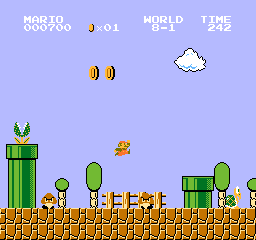Along with Nintendo’s newest piece of hardware comes something never before implemented in a home video game system. What I am referring to is the Virtual Console, which offers gamers the opportunity to download games from all of Nintendo’s prior hardware units, as well as the Sega Genesis and TurboGrafx, and play them on the Wii. It is a lovely idea, considering the immense library made available by including these systems – but is it worth the money?
The cost of each Virtual Console titles ranges from $5 for NES and TG games, up to $10 for N64 games, with SNES and Genesis games weighing in at $8 a pop… plus tax. These prices are just too much. Buying these games – the actual carts – nowadays is entirely less expensive, with N64 games fetching about $5 on average, and NES games coming nearly gratis at various auctions, yard sales, and bargain bins in retail stores.
 A solid argument to this might be something like, “Those old games don’t always even work, and who still has all the old systems, anyway? The Virtual Console games run flawlessly, and all sit neatly together in one place, in my living room.”
A solid argument to this might be something like, “Those old games don’t always even work, and who still has all the old systems, anyway? The Virtual Console games run flawlessly, and all sit neatly together in one place, in my living room.”
Well, that is true. However, I will do you one better.
In today’s world of super duper advanced computer technology, there are other ways to play ALL of these old games, all in one place. These nifty little programs are called emulators, and they’ve been around for ages. For those of you who DON’T know what an emulator is, I will take the liberty of learnin’ ya sumthin’. (Bear with me if you’re hip to this jive.)
An emulator is capable of taking raw game data, called a ROM, and playing it 100% accurately on a user’s PC. It takes up minimal space, and executes quickly and easily. ROMs are available for FREE at various places throughout the internet, and are not terribly difficult to locate. Once they’re on your hard drive, it only takes a USB game controller (or just the keyboard, if you’re cool with that) to enjoy the entire library of any game console of yesteryear. On top of that, these emulators are available for other platforms, too. Sony’s PSP is more than capable of running NES, SNES, Genesis, TG, PSX, etc. at full speed and with fine control.
This is where legality becomes a question. Some might argue that emulation is not exactly allowed, but there ARE stipulations to that. Any game an individual has owned at some point and not sold or given away is technically legal to possess in ROM form – considered a “backup” copy. Besides that, most old video games are often labeled “abandonware,” meaning that the copyright owner no longer supports the software, and has, in essence abandoned it as a viable commercial product. While this term really has no legal foundation, it is most certainly a veritable concept.
At some point, a game’s profit-making days should be over, or at least become nominal. Nintendo is notorious for squeezing the most it can out of every single franchise, game, or character. This ranges from milking a game series by making a half-million sequels, to re-releasing old games (updated or not) on newer systems, to charging $$$ to download about 500 kilobytes of data – 15-20 year old games – onto the Wii.

















